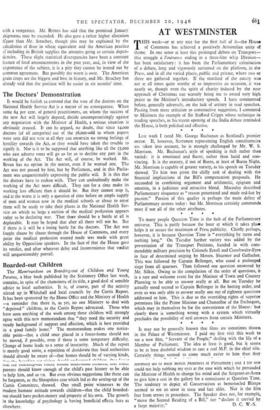Boarded-out Children
The Memorandum on Boarding-out of Children and Young Persons, a blue book published by the Stationery⢠Office last week, contains, in spite of the clumsiness of its title, a good deal of sensible advice to local authorities. It is, of course, part of the activity stirred up in Whitehall and local councils by the Curtis Report. It has been sponsored by the Home Office and the Ministry of Health âa reminder that there is, as yet, no one Ministry to deal with " deprived " children, as the Curtis Report advocated. Those who have seen anything of the work among these children will strongly agree with this new memorandum that " they need the security and steady background of support and affection, which is best provided in a good family home." The memorandum makes one notice- able pointâthat a child once placed in a foster-home should not be moved, if possible, even if there is some temporary difficulty. Change of home leads to a sense of insecurity. Much of the report is merely good sense, a repetition of desiderata that local authorities should already be aware ofâthat homes should be of varying kinds,
L. .4 . . ..1 E 1.1141 LI1C LA-1411.11116-.1JUL VIJILLLL J111/L111.1 J14111.1 {..11114./1,./1, 1.11411 1%/JIG'.
parents should know enough of the child's past history to be able to help him, and so on. But even obvious suggestions like these can be forgotten, as the Shropshire case which led to the setting-up of the Curtis Committee, showed. One small point witnesses to the modern humane attitude towards childrenâthat the child boarded- out should have pocket-money and property of his own. The growth in the knowledge of psychology is having beneficial effects here as elsewhere.


































 Previous page
Previous page